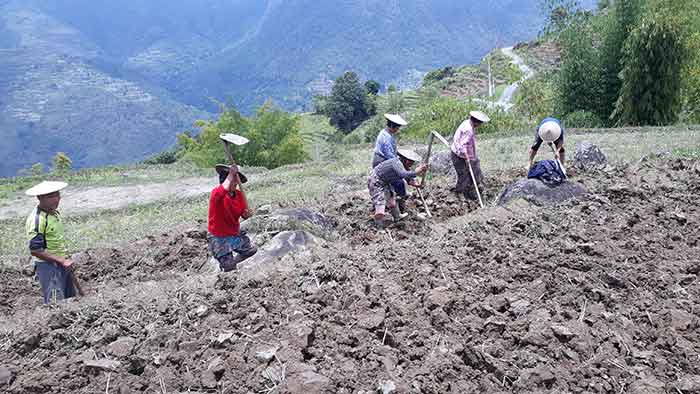Neten Dorji | Trashigang
At this time of the year farmers in Trashigang occupied with preparation of the paddy fields. But shortage of water and farm hands are the main problems human-wildlife conflict besides.
Chador, 66, from Radhi, has to wait for monsoon to prepare his two-acre wetland for paddy transplantation. There has not been sufficient rainfall so far.
“Rain has become critically important to crops,” Chador said
Radhi, known as ‘The Rice Bowl of the East’, is the leading rice-producing gewog in Trashigang.
However, the dzongkhag ’s rice production fell to 3,079.78 metric tonnes (MT) from 13,552MT in 2016. Fallowing of land is growing.
Radhi Gup Kulung said increasing goongtong or emptying household was a problem in the gewog. “Providing more power tillers could solve the problem. But land development also need to be prioritised by government.”
He said that production increased comparatively because of the use of power tillers and natural manure and fertilizer. “With the help of power tillers, the quality of soil has improved, resulting in better harvests. But most of time famers lose crops to wild animals.”
Phomeny mangmi, Tshering Gyeltshen, said that keeping fallowing of land was increasing. In some places, cultivated land has turned into forest. “With young people leaving for urban areas, there is shortage of farm hands in the villages.”
While electric fencing has benefited the farmers, he said that the government must explore solutions for human-wildlife conflicts. “A proper study should be conducted to understand the increasing human-wildlife conflicts every year.”
According to RNR census of Bhutan 2019, Trashigang and Trashiyangtse have 8,888 acres of fellow land and 3,070 acres of fellow land respectively.
In Trashiyangtse, out of 2,843.709 acres of cultivatable wetland, 821.315 acres remain uncultivated today.
Trashiyangtse’s Dzongkhag Tshogdu chairperson, Chosung Wangdi, said that rural-urban migration had increased.
The dzongkhag agriculture officers say that dzongkhag was working on resolving the issues of fallowing of land.


